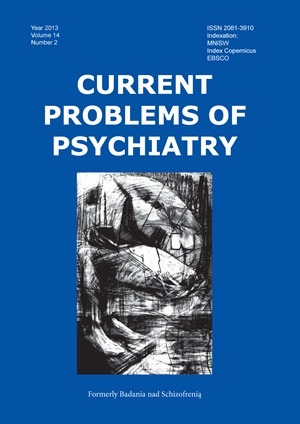Blogi - męska recept@ na nowotwór
Słowa kluczowe:
blogi, mężczyzna, choroby nowotworoweAbstrakt
Wprowadzenie: Blogi są jedną z wielu form aktywności wśród internautów. Ich treści służą autoprezentacji i poruszają różnorodną tematykę, odzwierciedlającą aktualne problemy społeczne. Wśród częstych tematów są problemy związane ze zmaganiem się z chorobami przewlekłymi, swoimi lub najbliższych.
Materiał i metoda: Analizie poddano 10 blogów o tematyce nowotworowej autorstwa mężczyzn.
Wyniki: Analizując treści zawarte w blogach można zauważyć, że są one formą radzenia sobie z chorobą, pokazując mechanizmy obronne i rodzaj integracji ego. Sam proces pisania jest formą autoterapii, pozwalający na odnalezienie się w nowej roli, tak by proces akceptacji choroby był jak najbardziej konstruktywny, poprzez sposoby radzenia sobie ze stresem oraz napięciem w przypadku trudnej sytuacji egzystencjonalnej. Sam fakt blogowania pozwala na m.in. na „oswojenie się” z chorobą, aktywnego zmagania się z negatywnymi skutkami leczenia. Ze względu na dojrzałość bloggerów, przedstawiane treści mogą być pomocne dla innych pacjentów.
Z medycznego punktu widzenia pacjenci opisują cały proces leczenia od diagnozy, poprzez chemioterapię, na badaniach kontrolnych lub fazie terminalnej kończąc. Pacjenci umieszczają także informacje o leczeniu medycyną alternatywną, jednak nie rezygnują z leczenia konwencjonalnego. Dodatkowo w sposób krytyczny pokazują funkcjonowanie służby zdrowia
Wnioski: Blogi pisane przez mężczyzn zmagających się z nowotworami ma pozytywny aspekt informacyjny i terapeutyczny zarówno dla pacjentów, jak i osób z grup ryzyka. Z jednej strony umożliwia autoterapię, z drugiej pozwala na utożsamianie się z osobą walczącą z chorobą.
Bibliografia
1. Kirkpatrick D. Efekt Facebooka. Warszawa: Wolters Kluwer; 2011.
2. Wallace P. Psychologia Internetu. Warszawa: PWN; 2001.
3. Łagód Ł. Jurkowska B. Nowicki G. Dąbrowska A. Prystupa A. „Słodkie życie” czyli blogujący cukrzycy. Current Problems of Psychiatry. 2012; 13(2): 134-137.
4. Dzidkowska J. Wojciechowska U. Zatoński W. Nowotwory złośliwe w Polsce w 2009 roku. www.onkologia.org.pl
5. www.rakrdzeniasty.blog.onet.pl
6. www.niepoddamsie.blogspot.com
7. www.nowotworjadra.blog.onet.pl
8. www.policzmysie.pl/blogi/nowotwor-mozgu
9. www.policzmysie.pl/blogi/przewlekla-bialaczka-szpikowa
10. www.majcik.blog.onet.pl/
11. www.jacekromanczyk.blog.onet.pl/
12. www.policzmysie.pl/blogi/wygrac-z-bialaczka-/
13. www.1ze175.blogspot.com/
14. www.starocie1.blog.interia.pl
15. www.policzmysie.pl
16. Gryniuk-Toruń I. Pomoc psychologiczna skierowana do chorego i jego otoczenia. W: Janowski K. Gierus J. (red.). Człowiek chory . Aspekt biopsychospołeczny. Tom 1. Lublin: Wyd. BEST PRINT; 2009:77-88.
17. Strelau J. Psychologia. Podręcznik akademicki. Tom 2. Gdańskie Wydawnictwo Psychologiczne; 2000: 616-617.


